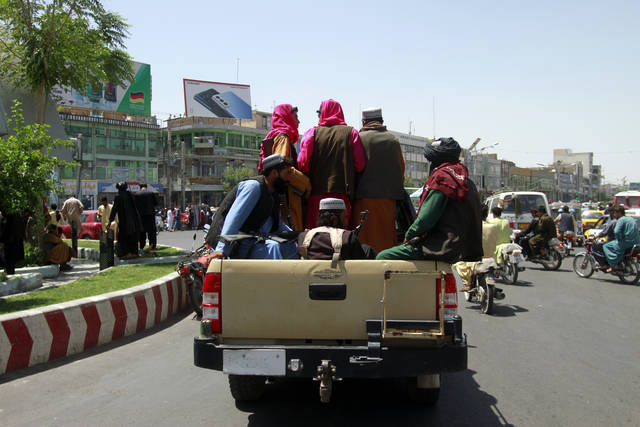Nearly 7,000 miles from the chaos embroiling Taliban-controlled Kabul, volunteers at the University of Pittsburgh are working around the clock to assist Afghan civilians who fear they’re in danger because of their work for the United States.
Tens to hundreds of thousands of Afghans now are desperately seeking help, from janitors and construction workers who built U.S.-funded roads and schools, to political allies and Afghanistan’s “best and brightest” who aimed to improve women’s rights, said Jennifer Brick Murtazashvili, director of the Pitt’s Center for Governance and Markets and a former adviser to the Department of Defense and United Nations.
“There are lot of people who have worked against the Taliban who are enormously at risk, who stuck their head out and never expected it to happen this quickly,” said Murtazashvili, who’s been studying Afghanistan’s turbulent political order and plight of civilians over the past 20 years.
“The risk to them is because they were working for America, and the Taliban has targeted those who worked for Americans in the very recent past. They rightfully fear for their lives.
“And I get the political decision to pull out. I wasn’t actually against it. I had very mixed views on it. … But you see the way that we left was so irresponsible.”
The Biden administration’s newly expanded refugee program vows to assist thousands of former U.S. workers stuck in Afghanistan, with the Pentagon pledging to help provide safe transportation for those approved. But current requirements and logistics are proving cumbersome, slow-moving and nearly infeasible for many panic-stricken applicants amid the Taliban’s turbulent and rapid takeover.
That’s why Murtazashvili rallied a small group of graduate students to assist with one simple-yet-critical piece of the dilemma: getting proof they previously worked with a qualified U.S. employer.
Inundated with Afghan civilian requests
The effort began soon after Biden announced the “Priority 2” resettlement option on Aug. 2, with the team fielding a huge influx of requests over the weekend.
As Kabul toppled Sunday night, the center received 200 more requests.
Part of the trouble stems from civilians having trouble getting a hold of former employers, including those they worked for five to 10 or 15 years ago.
“Organizations come and go, managers come and go, organizations merge, and some folks just have no idea how to find out how they get this letter (of employment verification),” Murtazashvili said.
The center can’t assist them all. The newly available “Priority 2” refugee option has a narrow definition of who can apply — namely, Afghans who are current or former employees of U.S.-funded programs, U.S.-based media organizations and U.S.-based nongovernmental organizations, along with those who worked for U.S. and NATO military operations but do not meet the requirements for a special immigrant visa.
Tens of thousands of others, and even more when counting those who worked for U.S. subcontractors or received U.S. grants, are not eligible under the current program.
“That’s the heartbreaking thing. You had to be on the payroll of an American organization,” she said. “You couldn’t be a subcontractor, you couldn’t be a nonprofit that got a grant from another organization, you couldn’t be a government official who worked alongside the Americans — and those are requests that we are getting a lot. They don’t qualify under the current rules. That’s something that should change.”
The center can’t provide any legal advice or other guidance, but Murtazashvili is open to collaborating with the likes of colleagues at Pitt’s law school or other local organizations to do so.
“But, right now, we’re just focused on this one very narrow thing which seems to be a huge concern for people because they can’t seem to make these connections themselves.”
Taliban pledges no ‘retribution,’ but critics skeptical
Taliban spokespersons have made initial assertions that they will not seek “revenge” or retribution on civilians, their families or property.
But critics, including dozens of human rights organizations and experts who addressed the United Nations on Monday, are not convinced that Afghan civilians are safe.
Murtazashvili described Monday feeling sick to her stomach as her smartphone continued to get inundated with desperate pleas for help and guidance on what to do next.
She’s hardly slept in days.
“The phone calls and the texts are nonstop. Many just have no idea what to do,” Murtazashvili said by email Sunday night, shortly before getting her own four young children to bed. “So many people stranded.”
Civilians seeking help range from office secretaries to Ministry of Defense officials “who were trained and taught by Americans” and people who work for the United Nations.
The speed at which the Taliban seized power, two weeks before the U.S. is set to complete its troop withdrawal after a costly two-decade war, has stunned the Biden administration and many in Afghanistan and the international community.
The U.S. military is sending another battalion of about 1,000 troops to help safeguard the Kabul airport as American forces killed two armed individuals there during a chaotic evacuation, Pentagon spokesman John Kirby told reporters on Monday. The development was a sign of the ongoing turmoil and violence as thousands of Afghans rushed onto the tarmac of Kabul’s international airport.
“People are exhausted, and they don’t have anything to fight for. The state just disappointed them. Our efforts disappointed them,” Murtazashvili said. “Look at how we left them. This, to me, is terrible for our state-building efforts. …
“We could blame Trump, we could blame Biden, we could blame Obama. I blame all three. Not for leaving — the strategy was bad. Twenty years, and you see how quickly this government collapsed.”
A joint statement from the U.S. State and Defense departments pledged to fly thousands of Americans, local embassy staff and other “particularly vulnerable Afghan nationals” out of the country. It gave no details, but high-profile Afghan women, journalists, and Afghans who’ve worked with Western governments and nonprofits are among those who most fear Taliban targeting for perceived Western ways or ties.The statement promised to speed up visa processing for Afghans who used to work with American troops and officials in particular.













